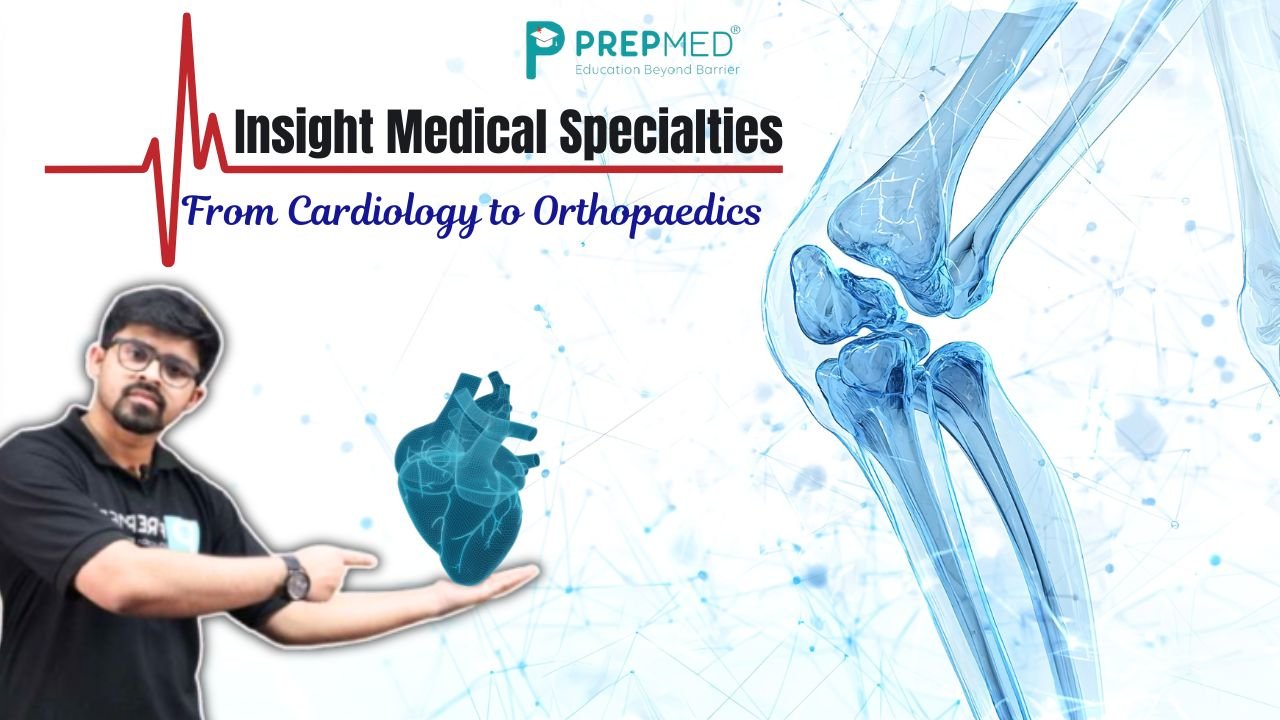November 21, 2024
Insight Medical Specialties: From Cardiology to Orthopaedics
The world of medicine is huge and diverse that offers a plethora of medical branches, catering to various requirements of human health and disease. Be it cardiology that deals with the intricate workings of the heart or orthopaedics that deals with the complexities of the musculoskeletal system, these two unique branches always fascinate us with their individual specialties and features.
Embarking on a medical journey through the swarm of medical specialties is similar to getting into a treasure trove for knowledge, each field contributing uniquely in maintaining the balance of the healthcare system. This article will let you explore the fascinating worlds of cardiology and orthopaedics, providing insights into their core journey.
Comprehensive care for all your medical needs:
Comprehensive care indicates that all your medical requirements are taken care of by an integrated approach to overall healthcare that ensures that each patient receives continuous and coordinated services and treatments. Comprehensive care includes primary care, various diagnostic services, specialty care treatment, emergency treatment and therapies, special care, and home care. Starting from early detection and treatment, comprehensive care aims to provide the best treatment to enhance the quality of life and foster not only better health management practices but also ensuring overall mental, physical, and psychological well-being of the patients.
How to get your dream branch in the medical field?
To achieve your dream branch in the medical field and live your life according to your expectations is not a smooth journey, it needs strategic ideas and planning, proper preparation techniques, consistent dedication, and hard work. Identify your passion and set clear future goals that will help you stay on track. Maintain high grades throughout your medical school and score well on various entrance exams like NEET PG, USMLE, and PLAB for admission to postgraduate courses.
Follow these tricks:
- Make sure that you follow your study routine seriously and participate in various related course studies. Aim for achieving high ranks in the entrance exams.
- Emphasize on gaining hands-on clinical hands-on experience through various internships in your preferred specialty degree.
- Engage in various medical course related research projects that will give you additional knowledge and help you in future career prospects.
- Try to build a strong supportive network and join medical conferences and associations to gain experience and knowledge. Ask for guidance and mentorship from your mentors who can guide you further in your chosen path.
Salaries:
Both these professions are paid well for their constant dedication and expertise in their fields. However, it depends upon your choice and interest to choose between these two that will provide you with career growth. The cardiologists have a comparatively higher salary as compared to the orthopedic surgeons.
The average salary of a cardiologist is around ₹17-18 lakhs in India, whereas on the other hand, the orthopedic surgeons in India earn on an average ₹15 lakhs annually.
Comparison of the hectic Schedule:
Both these professions have a busy and demanding schedule daily, but their nature of duty varies largely.
The cardiologists have unpredictable duty hours due to the sudden rush of patients having heart-related difficulties. The cardiologists need to be very aware while dealing with the various intricate arteries and valves of the heart, and manage the patients skillfully, perform the critical angioplasty procedure, and attend to patients with serious and complex heart issues with patience and calmness. This can result in their high stress and irregular long hours of daily rotational duties.
In contrast, orthopedic surgeons have a predictable and equally busy and stressful schedule. Their days and duty hours are occupied with scheduled surgeries, pre-operative care, dealing with post-operative complexities, and outdoor consultations. They also need to attend to the emergency rush of patients complaining about their fractures and injuries, which can indirectly increase their duty hours.
It is better to conclude that both these specialties have a dedicated and significant commitment towards their job.
Pros and Cons of these branches:
Pros for cardiology:
- A high demanding medical branch.
- Various significant opportunities in the field of research and innovation.
- Life saving treatments that provide the patients with a new life.
Cons for cardiology:
- Excessive stress due to critical heart problems of some patients.
- Irregular working hours and long training period.
- Disruptive work-life balance due to on call duty hours.
Pros for Orthopedics:
- Variety of surgical procedures to choose from to cater the needs of respective patients.
- Personal satisfaction from this job is very high as it has a decent work-life balance.
- Diverse opportunities for career growth.
Cons for Orthopedics:
- Long duty hours that can lead to mental burnout.
- Some emergency cases create a high-pressure environment that is difficult to manage many times.
- The prolonged period of training hours which includes medical school, internship, residency, and additional training can be emotionally and mentally challenging.
FAQS:
1. What do you understand by the term “Orthopedics”?
Orthopedics is the branch of specialization that deals with diagnosing, treating, performing required surgeries and providing various preventive measures to prevent muscular and skeletal disorders.
2. What is the recovery duration after an orthopedic surgery?
Recovery time varies from patient to patient depending on the complexity of the surgery performed and the overall ability of the patient to heal internally. However, this can range from a few weeks to several months.
3. What type of tests do the cardiologists perform to diagnose heart problems?
Cardiologists perform tests such as electrocardiograms (ECGs), coronary angiograms, stress tests, MRI (Magnetic Resonance Imaging) cardiac catheterization, and echocardiograms.
4. What are some common heart conditions?
Some common heart diseases are CAD (Coronary Artery Disease), Peripheral Artery Disease, Arrhythmia, and cerebrovascular disease.






